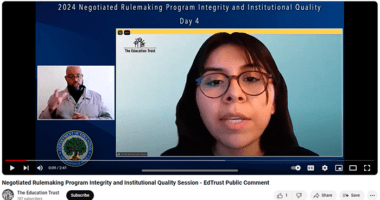The PROSPER Act Is About to Make College More Expensive
Last Saturday, I proudly joined thousands of students on college campuses throughout the country who are walking across the graduation stage to receive their diplomas this spring.
And in the coming months, I will join many of these same students as we begin to pay back our federal student loans.
Like many college students, I received financial support from the federal government to make my education possible. In fact, nearly 40 percent of undergraduate students and 45 percent of graduate students today rely on federal student loans to afford college. Research shows that a college degree can have life-altering benefits for students. For most students, taking out federal student loans is just a necessary investment in a valuable postsecondary process.
However, as Congress works to reauthorize the Higher Education Act — the law governing higher education in America — federal student aid has been put on the chopping block.
The Congressional Budget Office calculated that the House’s attempt to reauthorize HEA, a bill known as the PROSPER Act, will drain billions of dollars from federal student aid through the elimination of Supplemental Education Opportunity Grants, subsidized loans, and time-based loan forgiveness for Income Based Repayment over the next 10 years. What does this mean for college students? It means that, if passed, this bill would make the cost of a college education even more expensive.
The PROSPER Act’s efforts to undermine college affordability and failure to improve access to federal student aid means that fewer students will be able to afford the cost of college. This reality would have long-term devastating effects on our national economy, as research indicates 65 percent of jobs in 2020 will require postsecondary education. Additionally, decreasing financial aid and, thus, access to a college education, would paralyze social mobility for many Americans — especially for low-income students and students of color.
The good news is, we — students, taxpayers, and advocates — can stop the PROSPER Act from becoming law. If we truly care about college affordability, we must tell Congress to go back to the drawing board and find a bipartisan solution that makes a high-quality college education more accessible and affordable by investing in federal financial aid and opening the doors of opportunity to all students.












